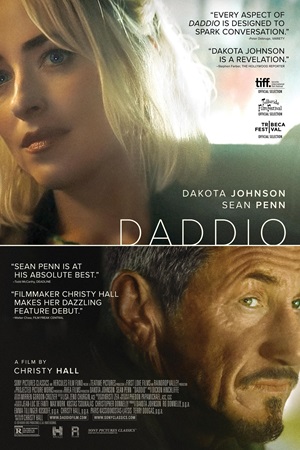
Frank Daddio a Cathartic Taxi Ride to Self-Discovery
A woman (Dakota Johnson) has arrived in New York after visiting family in Oklahoma. She climbs into a yellow cab driven by Clark (Sean Penn) wanting to get back to her apartment deep in the heart of the city.
Told mostly in real time, writer-director Christy Hall jumps from the Netflix television series I Am Not Okay with This to her first feature-length melodrama Daddio and does so with skill and intelligence. Coming across like something of a gender-balanced Locke crossed with Tennessee Williams and infused with a dash of Neil LaBute, this talky little two-person character piece got under my skin. Its frankness startled me. Its sincerity even more so. While I never fully bought that the two characters would engage as intimately as they do, their conversation still kept me glued to my seat, the graceful sobriety of the final moments even bringing on a handful of happily empathetic tears.
It all starts with Clark attempting to engage with his final fare of the evening with a pugnacious forcefulness that the young woman can’t help but take notice of. Even with the dyed hair, perfectly put-together ensemble, glossy lips, and multicolored acrylics, he clocks her as a tough-as-nails local from the second she stepped foot into his cab. She’s impressed and sets aside her phone for a few moments to verbally engage, the pair’s conversation only growing in unexpected specificity and fiery intensity from there.
Is Clark attracted to her? Does he look at the woman as a daughter? Is he bored and just happy to have someone in his cab willing to chat with him? As for her, does she need this conversation right now? Does Clark spark something inside her that makes her willing to open up to a complete stranger about so many ins and outs happening in her life at the moment?
Hall does not answer any of those questions. At least, not fully. Most of them (and more) she leaves hanging, understanding that this will likely be the only time these two characters ever meet, and that means pat resolutions would not happen. This is a good thing.
But this also gives the director at least partial license to allow their conversation to get deeper, more complicated, and brazenly more sexual than it likely would if this were to happen in real life. I did have to take something of a moderate leap of faith to be comfortable going with the flow of their dialogues, especially when things veer into some sort of strange combination of the When Harry Met Sally… “can men and women be friends?” conversation and something much, much darker than that.
That I did so without too much difficulty can partially be chalked up to Hall’s gift for dialogue. But as great as her writing may be, it is the casting of Johnson and Penn that makes it all sing. The former — who is also listed as one of the film’s producers — has rarely been better, only her performances in Cha Cha Real Smooth and the Suspiria remake exceeding it in my opinion. As for the latter, while his real-life persona has been rubbing me the wrong way more often than not of late, dang if his work as Clark is a magnetic reminder that he’s one the great actors of his (or any) generation. What he does in the role is nothing less than extraordinary.
The pair’s conversation goes to some fairly dark places. The woman’s phone messages reveal she’s got something happening in her romantic life that may not be entirely healthy. Clark, in turn, has had his fair share of trysts and liaisons during his lifetime, and while he refuses to apologize for many of his bad decisions (especially as they pertain to women), he equally recognizes how wrong some of them were and how much pain he was personally responsible for. He’s loved and lost multiple times, and while Clark doesn’t think he’d go back and change things if it were possible to do so, he does think the lessons he’s learned may be of value to the woman currently sitting in the back seat of his taxi.
Taking place almost entirely inside the confined space of the taxicab, veteran cinematographer Phedon Papamichael (Nebraska) still manufactures a visually dynamic panache that immediately drew me in. The colors of New York’s myriad of lights reflect off of the car’s windows and sparkle across the interiors, whether they’re coming from police vehicles, other cars caught in an unexpected traffic jam, or from the giant skyscrapers of glass and steel that overlook the city’s various bridges. There is a kinetic dynamism to this cab ride, and when fused with the unobtrusively minimalistic score from composer Dickon Hinchliffe (Winter’s Bone), the overall effect is mesmerizing.
Not everything Hall has done here works, and some of her writing can come across as mildly pretentious. The conversation does go off the rails a time or two, and as terrific as Johnson and Penn are, these moments when they occurred still rubbed me the wrong way.
But Daddio worked for me. Its final moments struck home, hitting me with an introspectively genuine authority that stopped my breath. Hall has a lot to say, and I wanted to listen to every word, even the ones I found unintentionally absurd. There are hard truths to be pondered, discussed, and learned from during this moonlight drive from the airport, and all of them are worth hearing.
Film Rating: 3 (out of 4)








